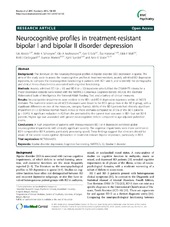| dc.contributor.author | Kessler, Ute | en_US |
| dc.contributor.author | Schøyen, Helle Kristine | en_US |
| dc.contributor.author | Andreassen, Ole Andreas | en_US |
| dc.contributor.author | Eide, Geir Egil | en_US |
| dc.contributor.author | Hammar, Åsa | en_US |
| dc.contributor.author | Malt, Ulrik F. | en_US |
| dc.contributor.author | Ødegaard, Ketil Joachim | en_US |
| dc.contributor.author | Morken, Gunnar | en_US |
| dc.contributor.author | Sundet, Kjetil | en_US |
| dc.contributor.author | Vaaler, Arne E. | en_US |
| dc.date.accessioned | 2014-07-11T09:25:15Z | |
| dc.date.available | 2014-07-11T09:25:15Z | |
| dc.date.issued | 2013-04-04 | eng |
| dc.identifier.issn | 1471-244X | |
| dc.identifier.uri | https://hdl.handle.net/1956/8141 | |
| dc.description.abstract | Background: The literature on the neuropsychological profiles in Bipolar disorder (BD) depression is sparse. The aims of the study were to assess the neurocognitive profiles in treatment-resistant, acutely admitted BD depression inpatients, to compare the neurocognitive functioning in patients with BD I and II, and to identify the demographic and clinical illness characteristics associated with cognitive functioning. Methods: Acutely admitted BD I (n = 19) and BD II (n = 32) inpatients who fulfilled the DSM-IV-TR criteria for a major depressive episode were tested with the MATRICS Consensus Cognitive Battery (MCCB), the Wechsler Abbreviated Scale of Intelligence, the National Adult Reading Test, and a battery of clinical measures. Results: Neurocognitive impairments were evident in the BD I and BD II depression inpatients within all MCCB domains. The numerical scores on all MCCB-measures were lower in the BD I group than in the BD II group, with a significant difference on one of the measures, category fluency. 68.4% of the BD I patients had clinically significant impairment (>1.5 SD below normal mean) in two or more domains compared to 37.5% of the BD II patients (p = 0.045). A significant reduction in IQ from the premorbid to the current level was seen in BD I but not BD II patients. Higher age was associated with greater neurocognitive deficits compared to age-adjusted published norms. Conclusions: A high proportion of patients with therapy-resistant BD I or II depression exhibited global neurocognitive impairments with clinically significant severity. The cognitive impairments were more common in BD I compared to BD II patients, particularly processing speed. These findings suggest that clinicians should be aware of the severe neurocognitive dysfunction in treatment-resistant bipolar depression, particularly in BD I. | en_US |
| dc.language.iso | eng | eng |
| dc.publisher | BioMed Central | eng |
| dc.relation.ispartof | <a href="http://hdl.handle.net/1956/8892" target="blank">Electroconvulsive therapy for bipolar disorder depression. Effects on depressive symptoms and cognitive function</a> | eng |
| dc.rights | Attribution CC BY | eng |
| dc.rights.uri | http://creativecommons.org/licenses/by/2.0 | eng |
| dc.subject | Bipolar disorder depression | eng |
| dc.subject | Cognitive functioning | eng |
| dc.subject | MATRICS | eng |
| dc.subject | IQ | eng |
| dc.subject | Bipolar II disorder | eng |
| dc.title | Neurocognitive profiles in treatment-resistant bipolar I and bipolar II disorder depression | en_US |
| dc.type | Peer reviewed | |
| dc.type | Journal article | |
| dc.date.updated | 2013-08-23T08:52:26Z | |
| dc.description.version | publishedVersion | en_US |
| dc.rights.holder | Copyright 2013 Kessler et al.; licensee BioMed Central Ltd. | |
| dc.rights.holder | Ute Kessler et al.; licensee BioMed Central Ltd. | |
| dc.source.articlenumber | 105 | |
| dc.identifier.doi | https://doi.org/10.1186/1471-244x-13-105 | |
| dc.identifier.cristin | 1023736 | |
| dc.source.journal | BMC Psychiatry | |
| dc.source.40 | 13 | |

